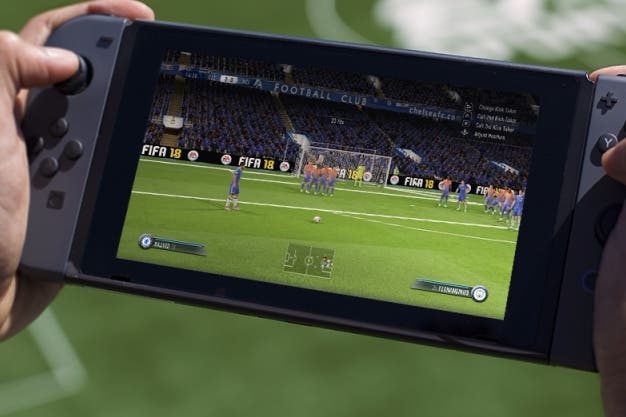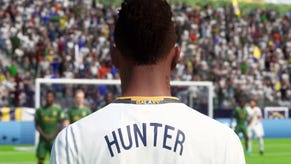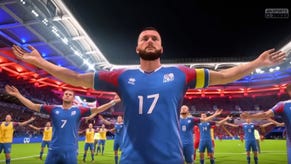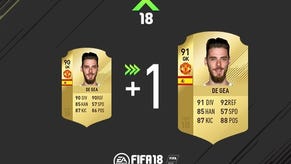The limits for FIFA on Nintendo Switch
"I don't think it's impossible to do more with this engine…"
The Switch version of FIFA 18 is a bit of an oddity. It's certainly the most fully-fledged FIFA we've had outside of the console and PC versions - Ultimate Team on a handheld console is quite something - but it's also, for obvious reasons, still a more limited version next to all their Frostbite-powered glory.
What exactly is FIFA on Switch, then? It's probably closest to the games we had on the PS Vita: a console-like, feature near-complete version developed specifically for the platform, from just about the ground up. But the Vita version, as players will less than fondly remember, very quickly degenerated into a yearly kit and roster refresh, packaged up and sold in a shiny new box with no other changes, at all, from game to game.
Back at Gamescom I played a little of the new game and spoke to Andrei Lăzărescu, a producer heading up the Bucharest EA Sports team that's in charge of FIFA on Switch, and while he couldn't to rule something like that out - "it's like reading the stars" - there's no cause for alarm just yet; there are obvious points where the parallels between the two left-field handhelds break down. For starters, the Vita version wouldn't hold up half as well - even in its time - if projected onto a full-size TV. There's also the fact that it didn't sell. "The Vita had the bad luck, from a hardware sales standpoint. It didn't help," Lăzărescu tells me. "The Switch right now is sold out almost everywhere in the world."
The hybrid console is brilliant, and clearly off to a strong start, but its future is still very much unknown; as a result FIFA on Switch is absolutely an experiment. The Bucharest team, despite a seven-year history of work with the franchise, is still learning, treating this first stab at the platform as a kind of recon mission, an exercise in data-gathering and analysis before it commits any further. It makes sense, and is a fairly obvious insight in many ways - we've seen far more cautious toe-dipping than this from big publishers on new platforms - but it's still refreshing to hear someone like Lăzărescu, blunt in a kind of endearingly enthusiastic way, be up-front about it, almost all of his answers permeated with an "I hope" or "I can't wait to see."
There is, also, an element of design to the caution - by which I mean a thoughtfulness, a concern for the player, beyond a jealous guarding of EA resources. With Ultimate Team, for example, Lăzărescu stressed a fear of overwhelming players with the sheer amount of stuff in the game. "if you look at the history of Ultimate Team on the likes of Sony or Microsoft - I think it's a seven year history if I recall correctly - that player base has also been accustomed to it already, and has been educated about it already, you know, so if you throw everything from the get go to a completely new player base, you might not get the desired result... even this [as it is] might be too much, it's huge."
It's a fair point - I'm unashamed to admit that I've got lost in menus more than once looking for a quick Kick Off game before realising I was still in the FUT section - but there is also an element of necessity there. Unlike other big games, of course, Lăzărescu stressed that with FIFA, "you don't get to play with a full calendar of dates," and that clearly has an impact.
"Every time we only have a year to do the game. You have to be very careful about the choices that we make and the features that we want to put in, because the date will not change. The date will not change in any way."
Be it a design decision, a sacrifice, or a bit of both, this time it's the FUT Champions and Squad Battles modes that don't make the cut. Is that because they expect Switch players to be more casual? "I see it as being more social," is perhaps the diplomatic way of saying 'yes' - but that's not necessarily a bad thing. While Lăzărescu stresses quite fairly that "casual represents different things to different people," the choice to drop those features is based on the type of audience they expect. "I look at them as two different games, two different worlds, that I think we should take for what they are, and keep in mind that we should not try to force people onto certain things just because it works on a certain platform."
That said, there's less choice in what can be done technically.
Frostbite, the engine adopted for the first time by FIFA 17, is what powers just about all of the main series' big updates this year - the Journey follow-up, the new 'cinematic' Career Mode transfers, the special animation system that Wes mentioned when he first tried the game, and even the more detailed stadia and crowds - and we've already established it's missing from FIFA on Switch. Instead, the Switch version has its own engine built from the ground up - "the hardware is very difficult," Lăzărescu says, and it means a future mode exactly like the Journey is "unlikely." Likewise those new additions I mentioned "would take an army of people, if it was possible, to be done."
So if 'foundation' is Lăzărescu's favourite word when talking about FIFA Switch ("to set a foundation base for the game" was also an internal goal, he reminds me), then 'compromise' is probably mine. It needn't be a negative thing. FIFA on Switch will, if it sells well enough, forge its own path. Those 'foundations' are versatile, after all - "I don't think it's impossible to do more with this engine." It's just a case of how you like to play.










